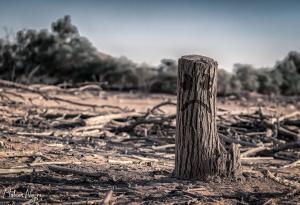
God created the heavens, the universe, and the earth, and saw them all to be good (cf. Gen. 1:31). Humanity was told it would be the steward of the earth. With that role, humanity was given authority, that is dominion, over the earth, not to use and abuse it for our own selfish desires, but to help preserve from harm. That is, God entrusted the earth to us, but sadly, we have failed that trust; we have broken the covenant God gave to us when God gave us that authority, and as such, the earth and all that is on it is as if under a curse. The words of Isaiah to the people of Israel, while applicable in his time for its own particular context, also has universal value as they can be used to also describe the consequences of humanity’s current violation of its covenant with God:
The earth mourns and withers, the world languishes and withers; the heavens languish together with the earth. The earth lies polluted under its inhabitants; for they have transgressed the laws, violated the statutes, broken the everlasting covenant. Therefore a curse devours the earth, and its inhabitants suffer for their guilt; therefore the inhabitants of the earth are scorched, and few men are left (Isa. 24:4-6 RSV).
The more we ignore our responsibility to the earth, the more we will see the words of Isaiah become applicable to us and our lives today. We should not be surprised that our sinful attitudes and actions lead to the earth being scorched. That is, climate change certainly is shown to be connected to humanity and its sins, which is why Christians denying the role humanity plays in global warming shows how neglectful they are of the lessons contains in Scripture.
Unless we change our ways, climate change will lead to mass death and destruction. Eventually, only remnant of humanity will remain, a remnant which will experience hell on earth before they, too, die, bringing the time of humanity on the earth to an end. Sadly, despite the warnings which we have been given, despite the science and the proof it has about the reality of climate change and the role humanity places in it, humanity continues to ignore its proper role as stewards of the earth. Every year, indeed, every day, there are more and more reports coming in revealing the devasting effects climate change is already having upon the earth, giving indication of how worse things will be in the future if it is not put in check. The earth will be cursed as a result of our sins.
Christians should know better. They should realize the responsibility humanity has been given remains with them to this day. They should know that they can’t just shrug off their duty. They should know if they do so, they would indicate how little they care for God and God’s ways. Christians, likewise, do not merely share responsibility to the earth with the rest of humanity, they have been elevated, thanks to grace, to a new, priestly position, so that their lives should be lived in such a way to share that grace, not only with others, but with the earth itself. They are not to take the grace given to them and abuse it, thinking it gives them the right to ignore their obligations to God or to each other. Grace is not meant to reinforce selfishness, but rather, to help perfect those seeking what is good and true. The more people try to hold onto it, keeping it selfishly for themselves, the more likely they will lose it, for they will have shown themselves not to be cooperating with it in their lives. It is, therefore, imperative for Christians to listen to prophetic voices, voices like Pope Francis in Laudato si (¶13), hearing how it is their duty to work with each other, and the rest of humanity, to protect the earth, realizing it is perhaps the most important challenge which faces humanity today:
The urgent challenge to protect our common home includes a concern to bring the whole human family together to seek a sustainable and integral development, for we know that things can change. The Creator does not abandon us; he never forsakes his loving plan or repents of having created us. Humanity still has the ability to work together in building our common home.
If we don’t take the threat seriously, if we don’t act now, we might not be able to do anything in the future. It might prove to be too late when we finally decide to act. This is why it is important every year to consider what we have done, or not done, for the sake of the earth. Earth Day serves as a good day to do that; if we are honest, this year, it is clear that the earth mourns and withers away because we have not taken that responsibility seriously. Every day, more and more reports reveal what is happening to the earth; many of them indicate the catastrophic consequences we will soon be facing if we don’t do something to correct our course of action today. While some might say that they do not care, because they think only others, in other parts of the world, will be affected by climate change, in reality, what happens at one place on the earth will end up affecting everyone. Thus, the melting ice in Antarctica will not just affect Antarctica, but the whole world, as Edward Doddridge over at The Conversation (April 17, 2023) indicated:
One of the largest seasonal cycles on Earth happens in the ocean around Antarctica. During autumn and winter the surface of the ocean freezes as sea ice advances northwards, and then in the spring the ice melts as the sunlight returns.
We’ve been able to measure sea ice from satellites since the late 1970s. In that time we’ve seen a regular cycle of freezing and melting. At the winter maximum, sea ice covers an area more than twice the size of Australia (roughly 20 million square kilometres), and during summer it retreats to cover less than a fifth of that area (about 3 million square km).
In 2022 the summer minimum was less than 2 million square km for the first time since satellite records began. This summer, the minimum was even lower – just 1.7 million square km.
With the ice melting, and not refreezing, the water has to go somewhere – and that place is the ocean. That means, the ocean waters will rise, and as it rises, it will have malign effects on those living on islands or on one of the many coasts next to the ocean. That is just one example of the way climate change, while it might have its initial effects seen at one place, will end up affecting the whole world. Indeed, even someplace as far away from the Antarctic as Texas will find the rising ocean waters a cause of concern, which is why engineers are trying to find a way to protect costal land from being taken over by the ocean.
The melting ice which is not the only threat we face thanks to climate change. It is just one of many examples which can be raised as to how it will affect us all. The main threat is the rising temperature, global warming. From it will flow all kinds of disasters. The earth will become far more hostile to life, including, and especially, human life. Thanks to global warm, we are likely to see the rise of all kinds of deadly plagues: COVID19 is but a warning of what is to come. And, while COVID19 was bad, it is likely the next pandemic will be far worse; for example, the next plague might come from flesh-eating bacteria.
Humanity, it seems, has abdicated its role of being steward of the earth; now, it has become its exploiter. As a result, the earth is cursed, cursed not by God, but by us and our sin. St. John Paul II in his Message For World Peace Day (1-1-1990) saw what was happening, and prophetically warned us, like so many others, of what lies before us if we do not end our sinful ways:
The gradual depletion of the ozone layer and the related “greenhouse effect”has now reached crisis proportions as a consequence of industrial growth, massive urban concentrations and vastly increased energy needs. Industrial waste, the burning of fossil fuels, unrestricted deforestation, the use of certain types of herbicides, coolants and propellants: all of these are known to harm the atmosphere and environment. The resulting meteorological and atmospheric changes range from damage to health to the possible future submersion of low-lying lands.
While in some cases the damage already done may well be irreversible, in many other cases it can still be halted. It is necessary, however, that the entire human community – individuals, States and international bodies – take seriously the responsibility that is theirs.
It really seems that environmental scientists and religious leaders alike are giving us the warning which we need to hear, the warning of what is going to happen if we do not change our ways and deal with the earth as responsible stewards looking for its proper cultivation. We find ourselves in a situation similar to the one Noah was described to have been in, or Lot when he was living in Sodom. Those who do not want to hear the warning about climate change, often end up ridiculing it, hoping that will make it go away. If only they were to open their eyes, they will see the truth behind it. Why don’t they? It seems, for so many of them, it is due to their selfish indifference; after all, many of them believe even if it were true, they will not see the worst effects of climate change in their lives, so they might as well enjoy today, even if tomorrow everyone dies. The sad thing, the really sad thing, is how many Christians are embracing this indifference, acting more like the people of Sodom and Gomorrah than as followers of Christ. They show why so many non-Christians, those who care about justice and the future of the earth, question the integrity of the Christian faith when Christians can act with such disregard for everyone else. They think such people, especially as they are among the most vocal of Christians, represent Christian thinking. Justly disgusted by what they see, they find themselves turned off from Christianity, leaving them with no interest to explore its claims. Christians need to do better. They need to denounce such voices and promote those, like Pope Francis, who in Laudato si (¶67), made it clear that Christians have some blame for the way climate change has developed because of the way they have used and abuse Scripture:
We are not God. The earth was here before us and it has been given to us. This allows us to respond to the charge that Judaeo-Christian thinking, on the basis of the Genesis account which grants man “dominion” over the earth (cf. Gen 1:28), has encouraged the unbridled exploitation of nature by painting him as domineering and destructive by nature. This is not a correct interpretation of the Bible as understood by the Church. Although it is true that we Christians have at times incorrectly interpreted the Scriptures, nowadays we must forcefully reject the notion that our being created in God’s image and given dominion over the earth justifies absolute domination over other creatures. The biblical texts are to be read in their context, with an appropriate hermeneutic, recognizing that they tell us to “till and keep” the garden of the world (cf. Gen 2:15). “Tilling” refers to cultivating, ploughing or working, while “keeping” means caring, protecting, overseeing and preserving. This implies a relationship of mutual responsibility between human beings and nature. Each community can take from the bounty of the earth whatever it needs for subsistence, but it also has the duty to protect the earth and to ensure its fruitfulness for coming generations. “The earth is the Lord’s” (Ps 24:1); to him belongs “the earth with all that is within it” (Dt 10:14). Thus God rejects every claim to absolute ownership: “The land shall not be sold in perpetuity, for the land is mine; for you are strangers and sojourners with me” (Lev 25:23).
The covenant with God between God and humanity, a covenant which can be seen connected to the Genesis myth, both in the story of Adam and in the story of Noah, shows us that humanity must protect and take care of the earth. We have not done so. We have neglected the covenant. And if we continue to do so, in the end, all that will be left will be the ruin which we leave behind. We will then have to come face to face with God and explain why we ignored our basic duty to the earth.
This Earth Day, this Earth Week, let us all agree that we must do something, that we can no longer ignore our duty to the earth. Christians and non-Christians like work together for the good of the earth. Christians must recognize that their teachings make it clear that they must care for the earth. We must treat it with respect, preserving it not only from harm today, but from harm in the future. Taking care of it is a way to honor our relationship and covenant with God. Ignoring it is a way to show how little we think of God and God’s ways. If we love God, then, we will do our part in protecting and preserving the earth. If we don’t, then we must ask ourselves, why, and what we can to change our attitude.
Stay in touch! Like A Little Bit of Nothing on Facebook.
If you liked what you read, please consider sharing it with your friends and family!
N.B.: While I read comments to moderate them, I rarely respond to them. If I don’t respond to your comment directly, don’t assume I am unthankful for it. I appreciate it. But I want readers to feel free to ask questions, and hopefully, dialogue with each other. I have shared what I wanted to say, though some responses will get a brief reply by me, or, if I find it interesting and something I can engage fully, as the foundation for another post. I have had many posts inspired or improved upon thanks to my readers.













